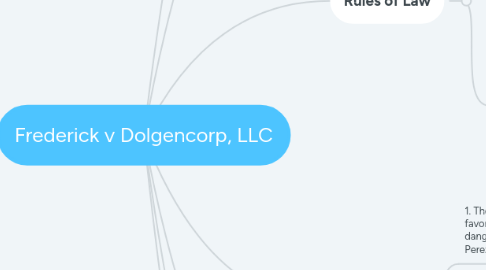
1. Facts
1.1. Parties include: Lindsey Frederick Dollar General (Dolgencorp, LLC)
1.1.1. 1. A bottle of laundry detergent was dropped and spilled by customer near checkout counter at Dollar General. 2. Manager and another employee were working behind counter. 3. When manager noticed spill, he left the counter to gather cleaning supplies, but failed to notify the other employee of the spill. 4. Another customer, Lindsey Frederick, entered the store, slipped on the laundry detergent and sustained injuries.
1.1.1.1. 1. The fall occurred 51 seconds after the spill 2. The store manager returned to the location of the spill 83 seconds after the spill took place with cleaning supplies 3. Frederick was not warned upon entering the store of the spill
1.1.1.1.1. Additional Details: It was noted in the employee and manager's deposition that this was a "preventable slip and fall" as a wet floor sandwich board was accessible behind the counter and was not used
1.2. Court granted Dollar General's motion and held that DG did not have "sufficient opportunity to correct or warn of the dangerous condition" and used "ordinary care to remedy the condition"
1.2.1. Frederick appealed
2. Issues
2.1. 1. Did Dollar General fulfill their duty to maintain the premises in a reasonably safe condition? 2. Did Dollar General fulfill their duty to warn Frederick of the danger posed by the laundry detergent?
3. Rules of Law
3.1. 1. Sufficient opportunity to correct the dangerous condition?
3.1.1. 1. a) Dominguez v Publix Super Mkts, Inc. concluded that the grocery store did not breach its duty to maintain the store in reasonably safe condition due to insufficient time of 13 seconds to clean a spill prior to customer's fall
3.1.2. b) Gaidymowicz v Winn-Dixie Stores, Inc. concluded that there was insufficient time to resolve the condition in the one-minute notice.
3.2. 2. Sufficient opportunity to warn of dangerous condition?
3.2.1. 2. a) Combs v. Aetna Ins. Co. concluded that granting final summary judgment in slip&fall case is inappropriate as record revealed issues of material fact surrounding duty to warn
3.2.2. b) Perez-Brito v. Williams-Sonoma Stores, Inc. applied Florida law and reversed trial court's order granting final summary judgment in a premises liability case where evidence demonstrated employees could have warned of danger of slipping and falling
3.2.2.1. There was evidence that employee was near the spill when it occurred but did not move near the spill to warn other customers; the associate manager could have remained at the spill and radioed to other employees to bring cleaning supplies but instead left the spill unattended
4. Analysis
4.1. 1. The court reversed trial court's grant of summary judgment in favor of Dollar General on issue of duty to warn Frederick of dangerous condition (see Combs v Aetna Ins. Co. and Perez-Brito v. Williams-Sonoma Stores, Inc.)
4.2. 1. Frederick states that Dollar General was negligent in failing to maintain the property in a reasonably safe condition, as well as failing to warn Frederick of a dangerous condition 2. Dollar General moved for final summary judgment arguing that despite knowledge of the spill, the ~1 minute lapse in time between the spill and the fall occurring was insufficient time to correct the issue. DG argues that the manager acted immediately to retrieve cleaning supplies to correct the issue.
4.2.1. The court notes that DG did not address their duty to warn Frederick of the spill in the motion. Due to depositions by the store manager and other employee working at the time of the incident, there was a contradiction in the court's finding that Dollar General did not have sufficient opportunity to warn Frederick, creating disputed issue of material fact
